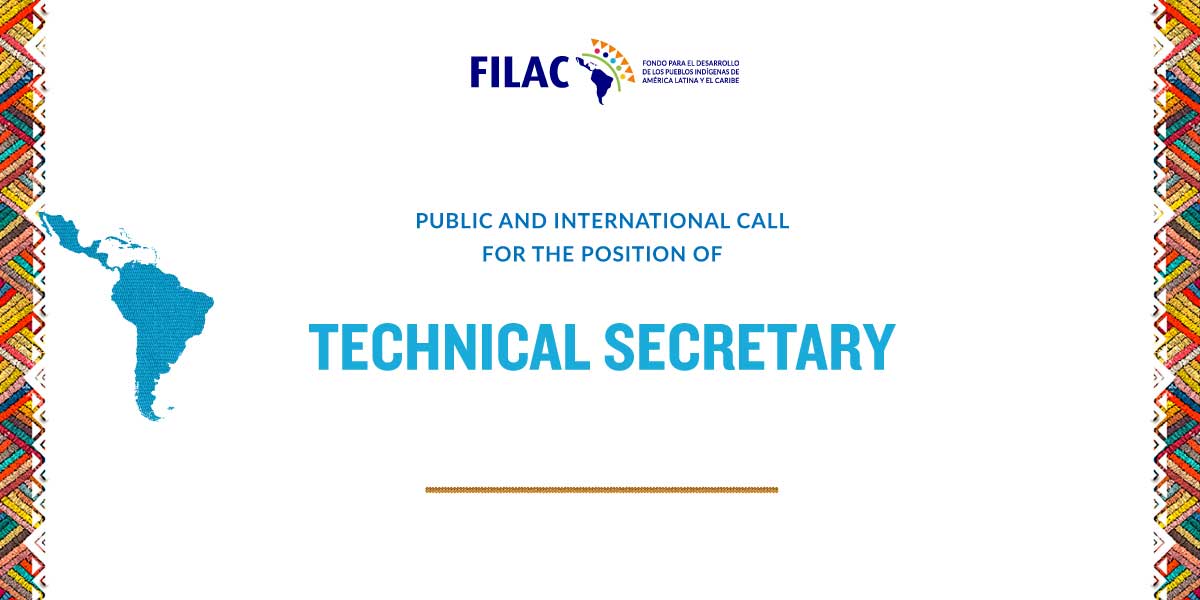The Fund for the Development of the Indigenous Peoples of Latin America and the Caribbean (FILAC), an international organization having parity of composition, created in 1992 by the II Ibero-American Summit of Heads of State and Government, with headquarters in the city of La Paz, Bolivia, launches this Public and International Call for the position of Technical Secretary of FILAC for the period 2023-2026.
As provided by the XIII FILAC General Assembly, the following Terms of Reference are established with the specific criteria and requirements:
General objective of the position
To lead the administrative and operational tasks of the Fund for the Development of the Indigenous Peoples of Latin America and the Caribbean – FILAC.
Specific objectives
- To manage the upholding and control of the technical and administrative structure;
- To consolidate the organization’s institutionality and financing.
Functions
The Technical Secretary of FILAC will carry out different functions related to: the Board of Directors, the meetings of the Board of Directors and Assemblies, the management systems, the general processes and the international coordination. (See the specific functions in the TORs).
Profile of the candidate
The Technical Secretary will be a highly qualified professional in terms of education, experience and/or knowledge, own knowledges and processes; prioritizing interculturality and gender equality criteria, and will not admit any type of discrimination.
Studies and degrees
Completed university studies (bachelor’s degree) in fields related to human development. A complete Master’s degree in related areas is desirable.
Experience
At least ten years of professional work including: management positions, technical and/or administrative management of programs and projects, planning, research, consulting, proven resource management and administration, institutional representation and public relations. Preferably, all of that would be related to development, indigenous affairs and public policies.
Special knowledge about the sector
A reasonable degree of knowledge of the contemporary dynamics of the indigenous movements, legislation and public and international policies on the sector, as well as a broad and proven knowledge of the situation of indigenous peoples and organizations, government entities and cooperation agencies connected to these peoples.
Technical and managerial abilities
Proven experience and ability for the planning, administration, technical and financial management related to Indigenous Peoples’ vision, and to manage and administer financial, technical, material and human institutional resources.
Personal requirements
- Availability to work full time and with exclusive dedication.
- Permanent residence in the city of La Paz, Plurinational State of Bolivia, which is the legal headquarters of the Technical Secretariat.
- Availability to travel on mission with relative frequency within and outside the region.
- Skills to produce official documents and to prepare and present reports.
- Experience in knowledge generation is desirable.
- Leadership.
- An impeccable public image – a good reputation.
- Knowledge of Spanish (exclusive), and an indigenous language, English and Portuguese are desirable.
- To be proficient in Information and Communication Technologies.
Specific considerations
- Preferably, to be an indigenous man or woman.
- To have the nationality of a FILAC Member State.
- To be familiar with the region’s Indigenous Peoples issues.
- To have proven skills in facilitating dialogue processes, conflict management and concertation.
- To have an intercultural management ability.
- To not be involved in any conflict of interest.
- To have no criminal records.
- To not have a labor relation with FILAC. Those officers interested in qualifying must suspend their positions for the duration of this Selection Process.
- To not be a member of any FILAC governing body. Those delegates or directors interested in qualifying must suspend their positions for the duration of this Selection Process.
- To not have family ties up to the second degree with officers of the Technical Secretariat or members of the Board of Directors.
Duration of the consultancy
The person selected for the position of Technical Secretary will be hired for three years, with a three-month probationary period. The contract may be renewed only once upon a favorable evaluation of the Board of Directors.
Applications
The applications shall be submitted online at the following link https://form.jotform.com/223214584541048 and must attach the relevant certifications from the competent authority until December 25, 2022.
The applications shall be made and received in a personal capacity. There are no applications by countries, sectors, organizations or otherwise.
Any communication involving an application or presentation of candidates by any institution or organization shall be considered only as a letter of recommendation and/or as a document that proves the applicant’s qualifications and experience.
TIMETABLE OF THE SELECTION PROCESS
| ACTIVITY | TERM |
| Launch and publication of the Technical Secretary call in Spanish, Portuguese and English | From November 20 to December 25, 2022 |
| Merit evaluation and background check | From December 26 to 30, 2022 |
| Formulation of a shortlist | From January 2 to 6, 2023 |
| Conducting of interviews and examinations | From January 9 to 13 |
| Selection of the Technical Secretary | From January 16 to 20, 2023 |
| Appointment of the Technical Secretary | From January 20 to 24, 2023 |
| Transition and handover process | January 30, 2023 |
| Start of functions | February 1, 2023 |
Professionals interested in applying for this call must fill out the online form before the indicated date; other resume formats will not be accepted.
SEE THE COMPLETE CALL


